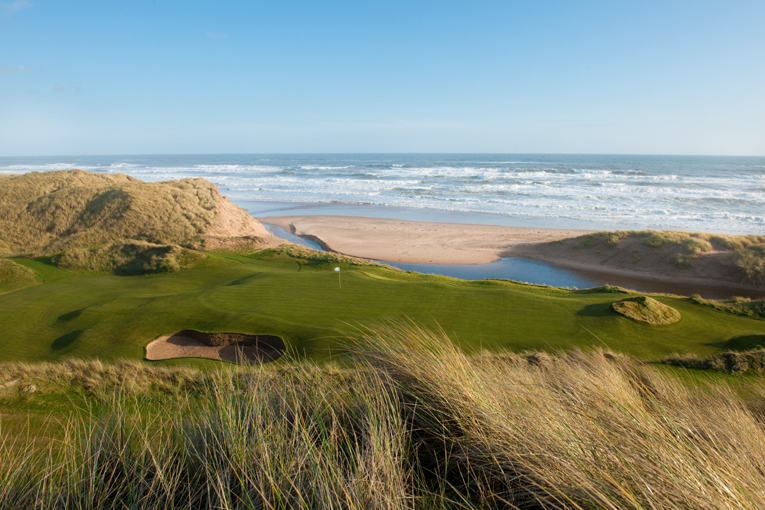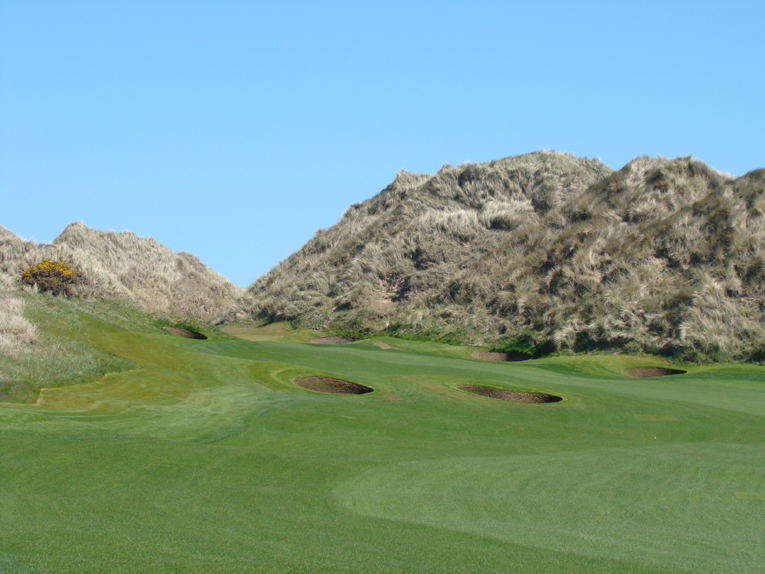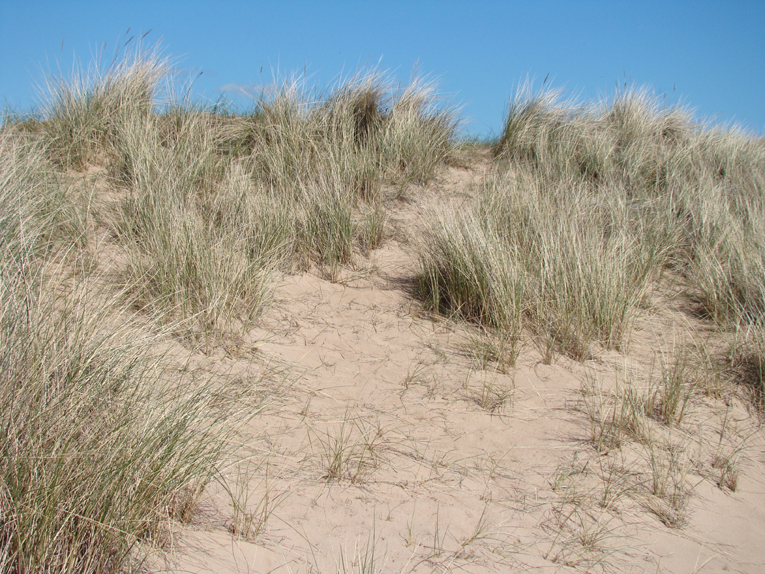Trump International Golf Links
Aberdeenshire, Scotland, United Kingdom
The dynamics of building a course on great land has changed even more than the game itself over the past two centuries. Enormous hurdles must be overcome so it is a cause for celebration when a great course on great land gets built successfully. Originally, linksland was perceived as having minimal value and held little interest. Farmers showed little interest as it was unfit for growing crops, in part because water drained too quickly through its sandy soil. Proximity to large bodies of water, particularly in Scotland, held little commercial value before WWII as the concept of summer homes and resorts had yet to flourish in scale.
Times have sure changed! Countries like Denmark forbid building near the coast. Anyone who has followed the trials and tribulations of Sharp Park in the United States knows the vitriolic hatred that environmental groups can spew, pitting the California Red Legged Frog in the dunes near the Pacific versus golf which has been unjustly cast as elitist. Back in the home of golf, stringent regulations for disturbance of any dune system are in place throughout the United Kingdom and Ireland. Such was not always the case. Links popped up with great regularity around the Scottish coast from 1850 to WWI. That pace has now slowed to a trickle. What a terrible shame it would be if no more links are built. Most golf operations enhance the local economy and provide needed employment for their communities. Thousands of golfers travel each year to revel in the beauty of these natural environments. If not for the game, coastal areas like Cruden Bay and Dornoch would be far less known.
Getting people outside also builds up their appreciation of the environment. Be it visiting a magical golf course or a national park, people return home freshly reminded of nature’s glories and the importance of preserving it. Over the past two decades, a minimalist golf architecture movement has enabled the construction of golf courses in dunes with only nominal environmental impact. The use of pesticides/herbicides is also on a marked decline. Despite such steps forward, challenges abound. Most parcels of land large enough for golf have been split and divided and split again over the past century. Small farms dot the landscape, making assembly of large blocs of land an arduous task. The term ‘special interest group’ didn’t exist a century ago and now seems to be everywhere.
Yes sir, the prospect of building something special is so daunting as to be hopelessly demoralizing. Many owner/developers stop trying. Only a very few have the wherewithal and staying power to make something happen under such adverse circumstances. Happily, one man persisted and ultimately gained approval to build in the great dunes north of Aberdeen, Scotland. Formed during the various ice ages, these dunes are among the most spectacular in the world and soar to one hundred and thirty feet in spots (by comparison, the splendid dunes at Royal Aberdeen measure closer to eighty feet). Due to water currents, wind and sand deposits the largest dunes in the northern hemisphere are frequently found on west coasts. Consider Ballybunion, Lahinch, and Inniscrone in Ireland, Royal Hague in the Netherlands and Denmark’s Fano Island. An exception occurred here on Scotland’s east coast with the stretch of dunes from Fraserburgh down to Murcar and Aberdeen. Few if any locales have dunes more magnificent in size and scope than amid this 2,000 acre wild, rugged tract than seemed destined for golf. Why a course had never been built among these great dunes is a mystery. Perhaps it was too removed from a population base before the wide availability of the automobile? It wasn’t like Prestwick or Aberdovey where the train stopped.
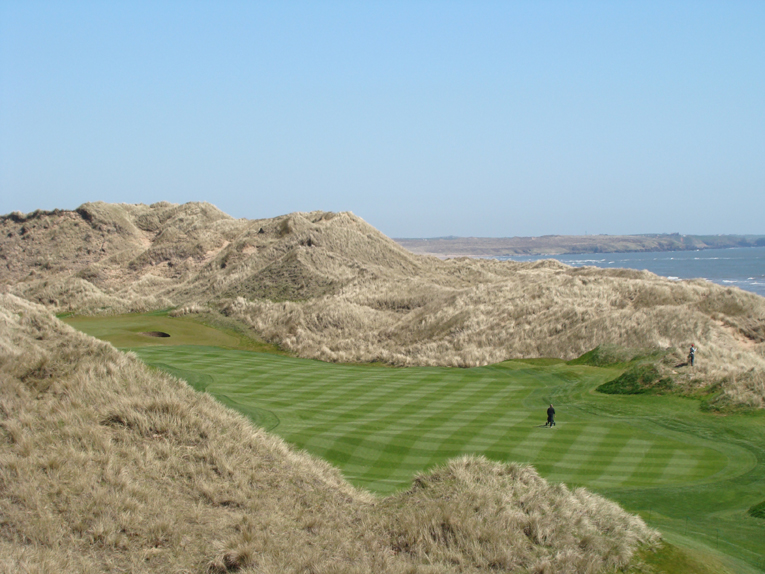
The most trite, misused expression in golf course architecture is ‘God intended this to be a golf course.’ Yet, it applies here!
To say that the region has a long and distinguished golf history is an understatement. The Society of Aberdeen Golfers was formed in 1780. Golf soon followed at Port Errol near Cruden Bay and at Peterhead in 1841. One hour to the north is Fraserburgh. who claims to be the oldest golf club under its original name. Sheep must have felt a loss of job security with the advent of grass cutting equipment in the 1830s!
With dogged determination and an iron will, the developer of Trump International wouldn’t accept the local council’s rejection as the final verdict. Ultimately, the Scottish parliament granted the right to build golf here. Feelings were hurt and parties who didn’t get what they wanted felt cheated. Sadly, and unnecessarily, the process for golf approvals has become more acrimonious than at any time in the game’s history.
With permitting in place and tight construction parameters required, the onus fell back on the owner to deliver something special. What a horrid waste it would be to spoil such special land with a mediocre product. Hype wouldn’t do – only a world-class facility could suffice. Crucially, the owner hired an architect who had demonstrated a comfort working amid cherished dunes. With Martin Hawtree, the owner got a man whose firm had experience in dunesland from Lahinch to St. Andrews. Construction began in 2010 and the course opened for play July, 2012. The better the land, the less man has to do and the quicker a course can be built. Such was the case here. As orchestrated by Green Keeper John Bambury and his crew, the blend of fescues in the fairway and the bent fescue blend greens have grow-in well despite some unusually harsh weather. As of June, 2013, the greens were already up to a 10 on the stimp, which is a very short time for fescue greens to knit so well.
The give and take between the owner and architect paid off well. The optimal way to critique their work is to go hole by hole as we will below. The course measures 7,430 yards from the championship tees. While this may seem preposterously long, the course was conceived with the expectation of hosting the very best. The second distances noted below are from the 6,600 yard tees which are eminently enjoyable for the man whose handicap is stuck at 8 as he tries to be a good husband and father.
Holes to Note
First hole, 540/490 yards; Given the polarizing nature of the owner’s bombastic public persona, many golfers arrive wanting to love the course but there’s likely a similar number who want to pick it apart. One early criticism that took hold when the course opened was that it was too penal. Thus, the neutral player may be shocked to see this warm, inviting opener.

A fairway sheltered between two dunes gives the golfer a wide playing corridor and plenty of room to limber up as he makes his way down the first. The nearby state of the art practice area, a distinct rarity in Scotland, makes it a potential birdie hole.
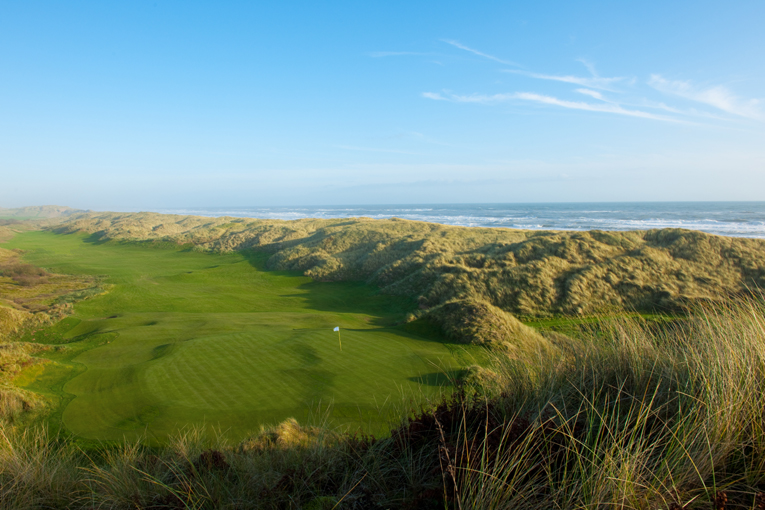
As seen from behind, each shot gets progressively tougher, the mark of any good par five. Today’s hole location on the left plateau is a particularly fiddly one to which to get close. The wind off the North Sea is seemingly only satisfied once it pushes a ball down to the lower level!
Second hole, 445/410 yards; The hype surrounding the owner and his high profile projects is enormous. Does he deliver? Golfers have heard and read about the ‘Great Dunes of Scotland’ for many months leading up to the course opening. Can any course live up to such a crescendo of superlatives? Stand on the tee of the second and one gets the distinct impression that this course may be the real deal. Indeed, the unmarred view of the breathtaking landscape below creates a hope that expectations might be even exceeded as the land is that exceptional.
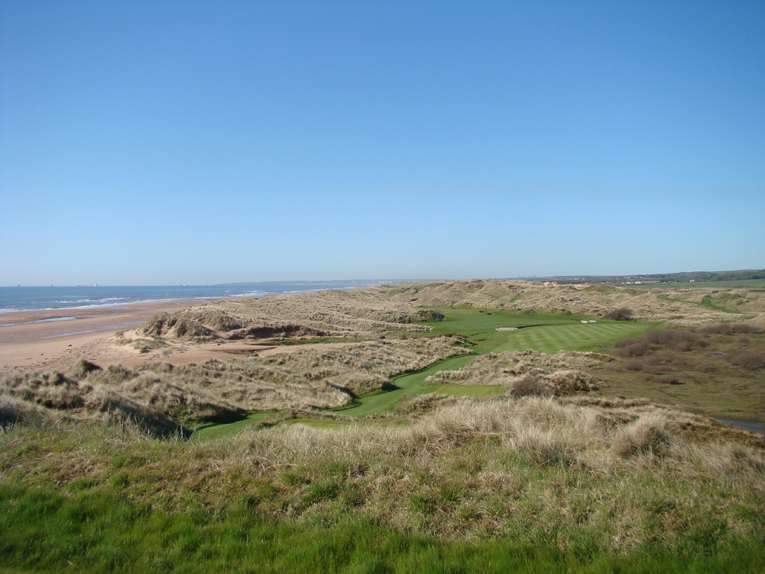
No marketing team required – the view says it all. A unique design element is present and it provides an interesting rotation between the intermediate and back markers. In this case, the intermediate tees enjoy the cat-bird seat while the back tees are lower and to the left.
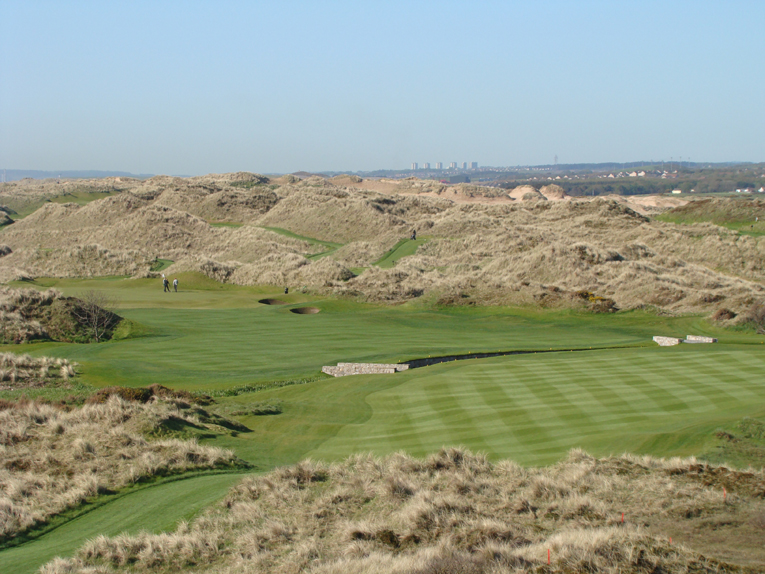
Zoom in and one finds that the picture-perfect postcard hole is full of good golf values. The farther one skirts past the wetlands on the right, the better one’s approach angle is to the green. A tee ball that finishes somewhere between the two stone bridges is ideal. Note how the open green allows for any manner of approach, including a run-up one with a hooded long iron on this hole that plays into the prevailing wind.
Third hole, 205/165 yards; This is one of the best-situated greens anywhere in golf, as the putting surface is but twenty-five yards from the edge of the North Sea. The sound of the waves helps make the connection to nature particularly intense. The front left to back right angle of the green oriented to the coastline is most appealing. Apart from the natural beauty, we note that the course starts 5-4-3, a perfect flow of pars. It closes 3-4-5, a sure show of how much time Hawtree spent in getting the balance and sequence of holes just right.
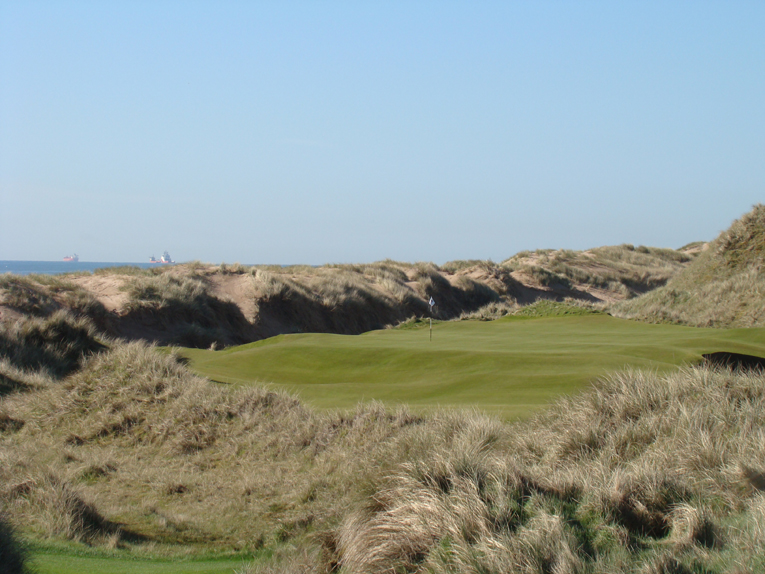
The pushed up green pad feels like it has been here forever and is surrounded short, right and behind by short grass. A multitude of recovery options exist.
Fourth hole, 565/515 yards; This long hole takes the golfer to the southern end of the course where the fifth through ninth then loop back to the clubhouse. Though the winds can come from any direction, the prevailing one here is against the player. Since three of the four par fives play in this same direction, the good player might have to look elsewhere for birdies. It is refreshing to see genuine three shotters still playing a role in links golf. The curse of the fast and firm edict is how to build par 5s that actually play as such and not just as long par 4s. Hawtree’s routing that sends three of the four into the prevailing wind is shrewdly brilliant. No doubt George Crump, the founder of Pine Valley and a strong advocate for genuine three shot holes, would approve. Crump might not approve of the similarity of the cluster bunkers used on those same three holes. There are just too many penal pot bunkers to create strategic pockets. Unless, the player can easily carry them, the lure isn’t there for him to flirt with them. This is a minor flaw and easily fixable with the removal of several bunkers, something that would only take a couple of day’s time. The big bones of the design (routing, general green placements, strategy) are excellent and à la every Open Championship links, minor adjustments will forever be made/required. To that end, it’s a plus that the decision making process at Trump International is – shall we say – streamlined!
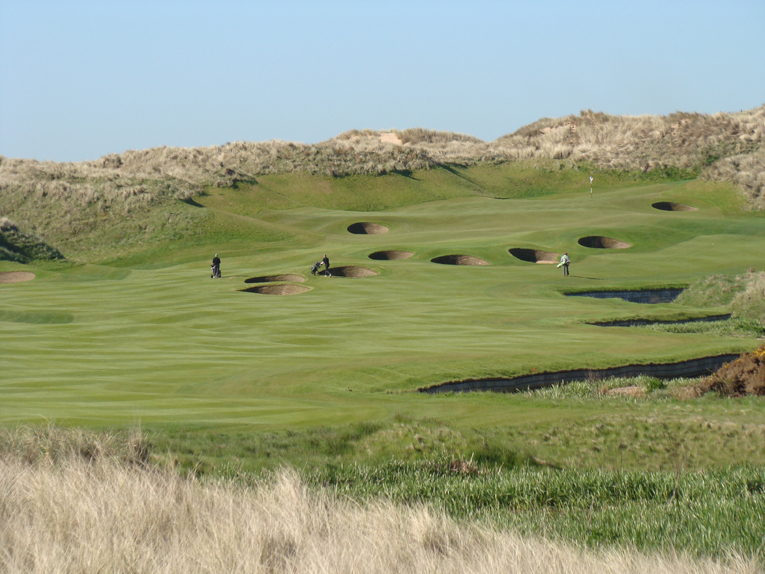
A unique challenge is posed off the tee in the form of the long Blairton Burn that snakes along the right side of the fairway. Note the back top right hole location. The elevated green site made it easy for Hawtree to build a putting surface that drops five feet (!) from back to front.
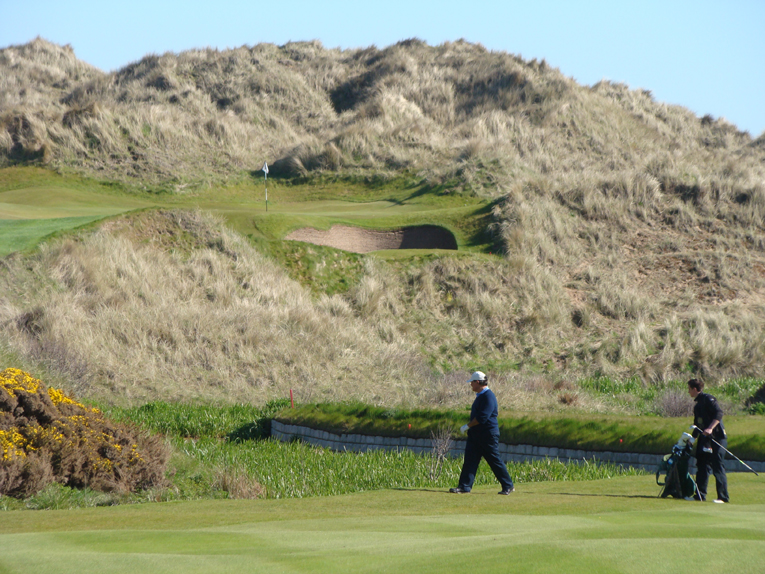
Though disconsolate that his pushed tee ball found the burn, the golfer can take solace in the superb environment in which he finds himself. From the first tee ball to the final putt on the Home green, the ambience is inimitable.
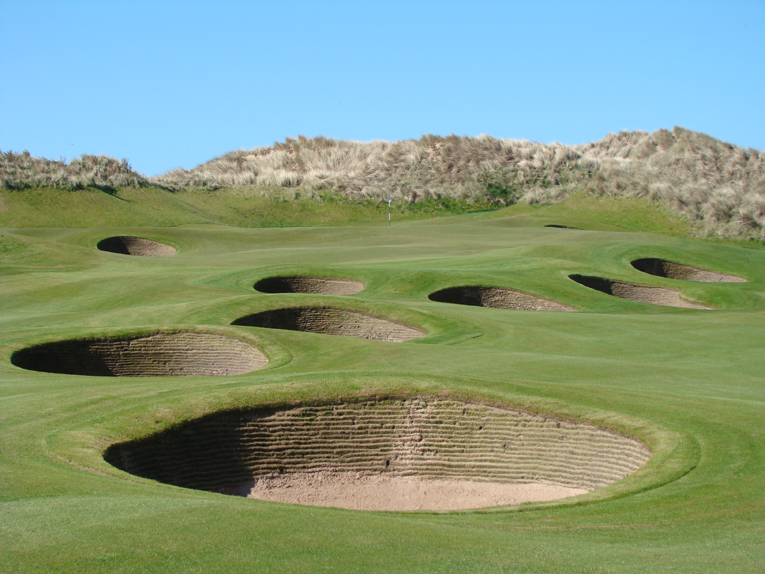
The cluster of bunkers found 20-90 yards from the green is a design theme repeated at the first and eighteenth. Throw in the opposing wind and third shots into all these par fives is likely to be longer than what the golfer is accustomed.
Trump International Golf Links
Aberdeenshire, Scotland, United Kingdom
Fifth hole, 385/355 yards; After two par fives and this intermediate two shotter the golfer starts to relax and forgets about the erroneous early reports that portrayed this course as an unmanageable beast. In fact, it dawns on him that he is having great fun. This cute placement hole is made by the left central hazard and left hole locations on this wide but shallow green that steps down to a lower left section. The 5,800 square foot green requires one of the most precise approach shots of the day.
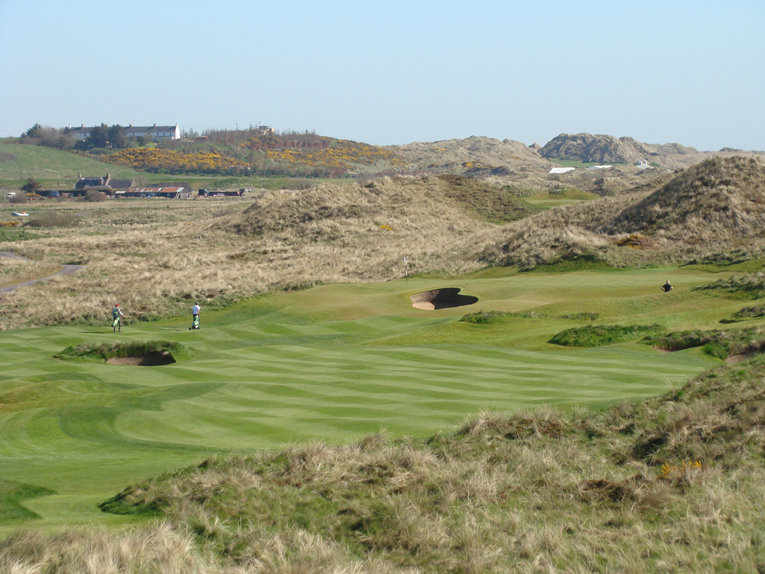
Revetted bunker faces were chosen because the course could be made ready for play more quickly after foul weather with this style than traditional sand-faced ones. Some might favor the blown-out look of Pacific Dunes or Sand Hills but these possess the single greatest attribute – they are well positioned. The left center hazard 90 yards short of the green is a prime example.

Curiously, the bunkers at the fifth have growth on their top edges, which sets them apart. Congratulations to the construction team for preserving/creating one and two foot random humps and bumps within the fairway. The golfer will likely have to make slight adjustments to his set-up, a hallmark of links golf. Extremely gratifying is the sight of a ball carrying the greenside bunker, swinging hard left down the slope and nestling close to this day’s lower left hole location.
Sixth hole, 185/170 yards; Given the owner’s reputation, one thing was certain: world class golf holes had better emerge from the project or it would quickly fall from grace and the emperor would have no clothes. Give Hawtree extra kudos for delivering this all- universe hole. Magnificently steeped in nature, this hole’s setting makes one shotters elsewhere seem inconsequential.
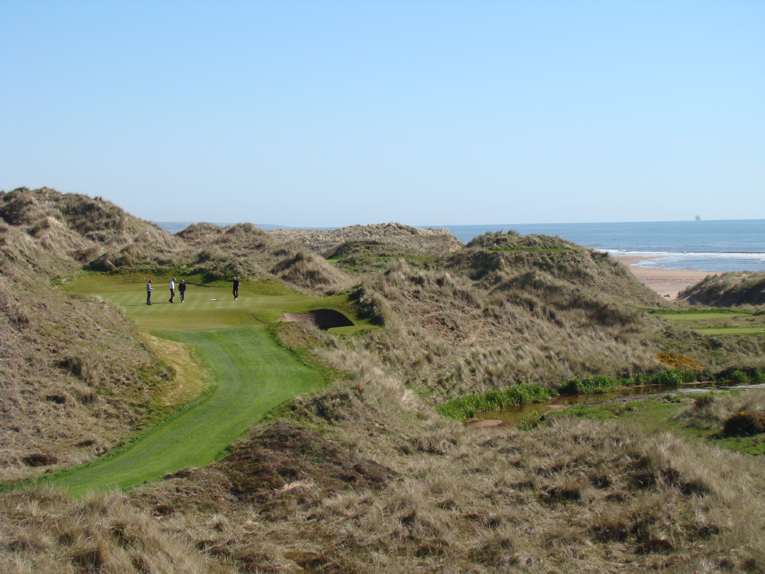
Played from dune top to dune top, this hole is the stuff of dreams. Like the third, only one bunker was required.
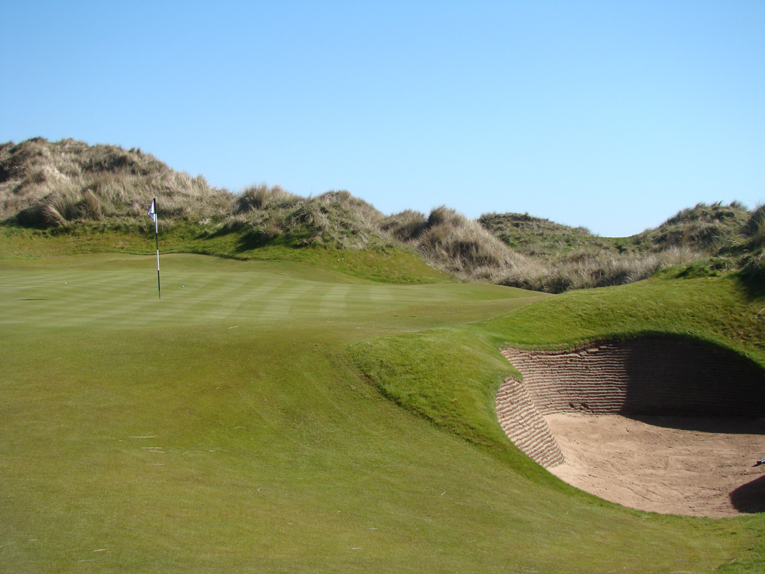
The bunkers are true hazards. Their steep revetted walls coupled with small concave floors conspire to make recovery difficult. Sometimes, play in the direction of the flag is not an option.
Seventh hole, 280/245 yards; From 1950 to 1990, few drivable holes were constructed. It slowly began to change and around 2005, they became ubiquitous. Perhaps there are too many. Yet the only question to answer: is this hole the absolute best use of the land? In this case, the seventh fits well with the dunescape and yet…… something isn’t quite right. Ignoring crazy weather days, golfers of every caliber are urged/forced to have a lash at the green. The reason? The lay-up shot is no more of a bargain than having a go. Hawtree is aware of this issue and a tweak or two is expected.
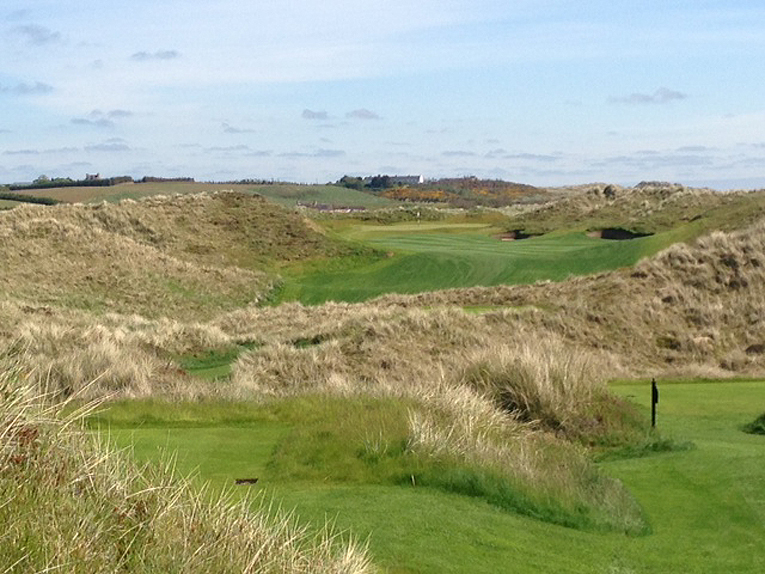
With two penal bunkers guarding the none-too-big lay-up area, why not have a go at the green? Ideally, players should be torn on the tee as to the correct decision with half choosing each option.
Eighth hole, 500/465 yards; Given the course’s supreme location, the WOW factor was never an issue. The more germane question was whether the natural landscape would be allowed to stand on its own or would tricks be employed to add ‘excitement’? Happily, restraint prevailed as exemplified here. The publicity photos are of the more heavily bunkered holes on the course (e.g. the fourth and eighteenth), so it is worth noting that eleven of the eighteen holes have one or no greenside bunkers. Bambury makes the point that the green surrounds are the same seed mixture as the greens themselves. There is a whooping 323,00o square feet (!) of greens complex turf on the course (which equates to an average of 18,000 square feet per hole) with the only difference between the surrounds and the greens being the height of cut. Bottom line: there is lots and lots of short grass and loads and loads of recovery options around the greens.
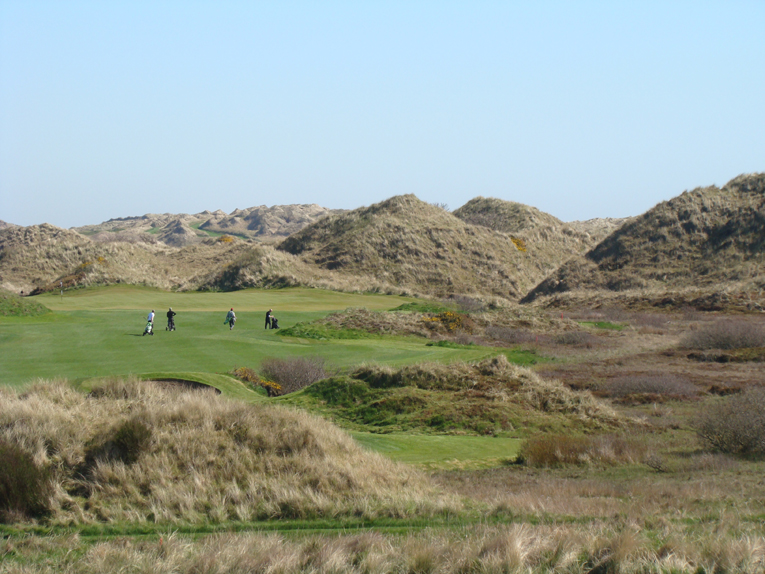
Trump International is a meld of rock solid holes: here, nine and eleven which blend seamlessly with some one-of-kind, spectacular ones like the three, six and fourteen. The golfer’s senses are elevated but never overwhelmed, an attribute of all great courses.
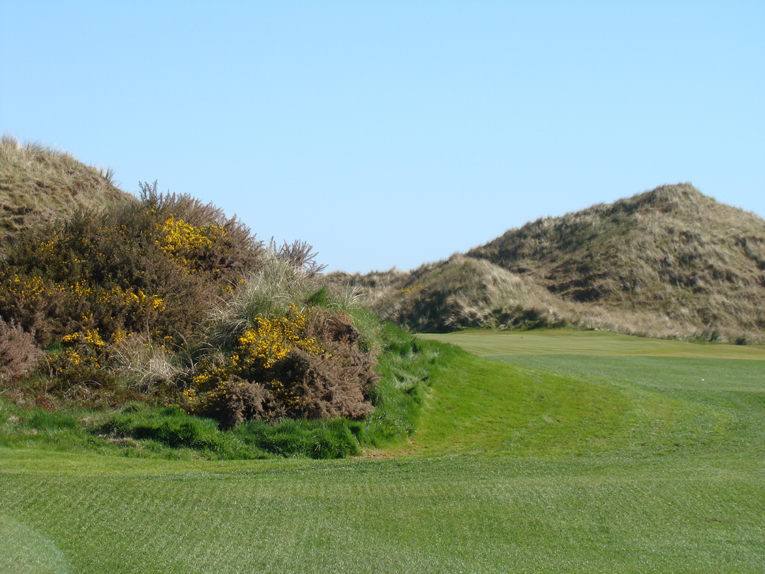
From the safer, left edge of the fairway (i.e. the side away from the hazard), left hole locations are blind.
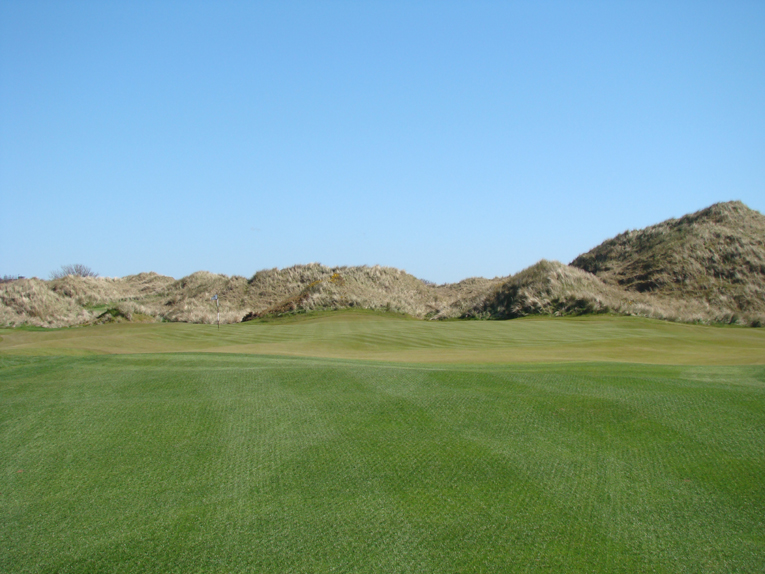
The enormous 11,300 square foot green with its slight rolls and random puffs is a thing of beauty and is one of the author’s favorite features on the course. Golfers of all levels have fun manufacturing approach shots to this open, lay of the land green.
Ninth hole, 470/425 yards; Interesting, nuanced angles of play go a long way toward determining how much fun a course is to play time and time again. If a course is too straightforward, its charms wane. Here, a dip feeds into the swollen right side of the fairway and shunts tee balls laterally. From there, approach shots must be played over the edge of a dune into the deepest green on the course at 54 yards in length. Fine subtleties abound: Tee balls nudge right, a blind to partially blind approach on an oblique angle to a long green with a back left hidden bunker. The golfer who can hold his ball on the left half of the fairway is rewarded with the best look down the length of the green.
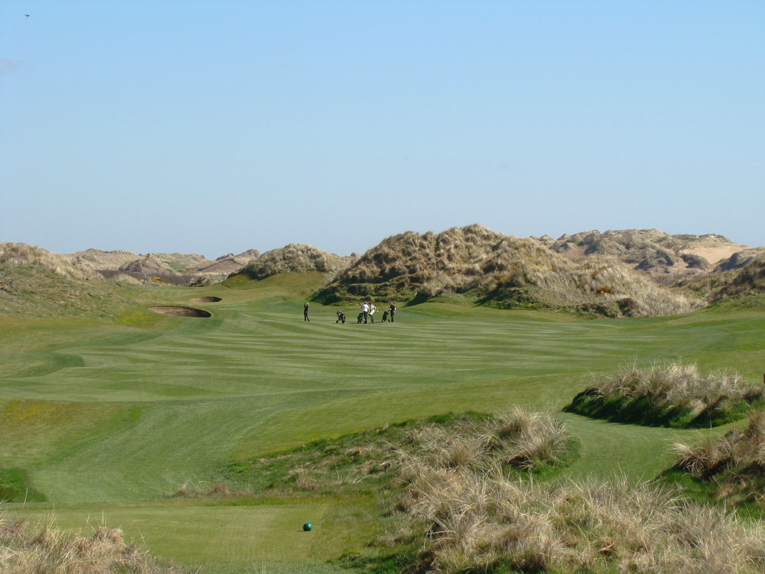
An A+ grade goes to this golfer for holding his tee shot down the left. Tee balls that drift farther right leave a blind approach over the tall dune.
Tenth hole, 575/495 yards; Primary to any links is how well its holes interact with the dunes. Some golfers, especially low markers, prefer links like Birkdale and Muirfield where perfect optics are frequently provided. Yet, without the occasional blind shot the traditionalist won’t feel connected to the dunescape like he will at gems like Prestwick and Rye. Conversely, too many blind shots and courses become ill-suited for hosting major events. Hawtree did an admirable job walking that fine line so that both the old fashioned links lover and the modern player will both find things to like.

This view from behind the tenth green captures the angles of play. The golfer needs to work hard on his first two shots so that he is has a good look up the angled green for his third. Otherwise …
Eleventh hole, 470/455 yards; The back tee provides the highest vantage point on the course and it is worth a clamber up the dune for a look. You might even swear that you spy the Netherlands across the North Sea, so commanding is the view. Though the golfer has already had several postcard moments from elevated tees at the second, fifth, sixth, and eighth, he greedily soaks up another. So what about the golf? The hole lives up to its auspicious start. The player who stays on the inside of the dogleg right has the best angle into another well conceived green complex.
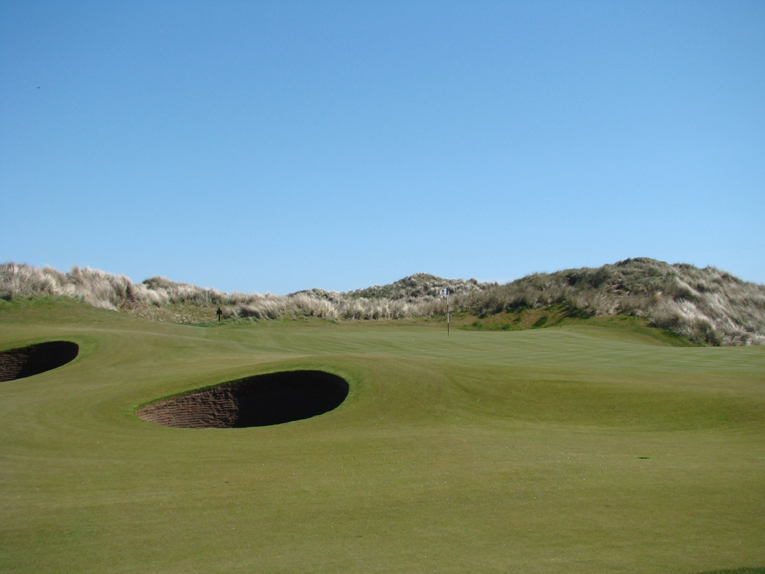
The putting surfaces at Trump International are nicely varied and never over the top. If you prefer your links greens to be like St. Andrews, you might wish for more interior contour. If you like the putting surfaces at Scottish stalwarts like Troon and Carnoustie, you’ll be content. Certainly, too much interior green contour is risky in such a windy location. Personally, the author sees similarity here with Alister MacKenzie’s approach at Cypress Point: well done but never to the point that they distract the eye from the glorious surrounds.
Twelfth hole, 435/365 yards; Backdrops to golf shots are important. The curse of so many downhill drives is that the overall sensation of the tee ball falling out of the sky begins to wane, no matter how spectacular the landscape. This tee ball features the North Sea at eye level and provides nice variation. The green nestled past a depression against a dune is another visual enticement.
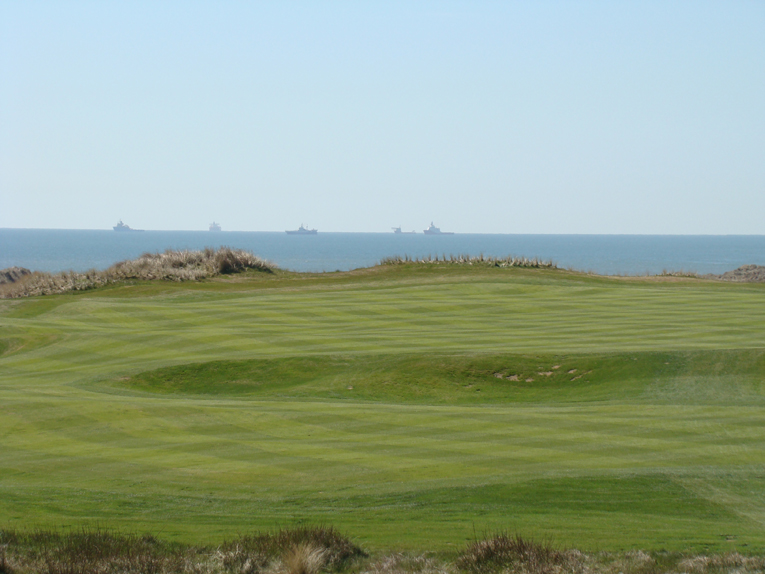
As seen from the tee, the ships remind one of Aberdeen’s long distinguished history as a major maritime center.
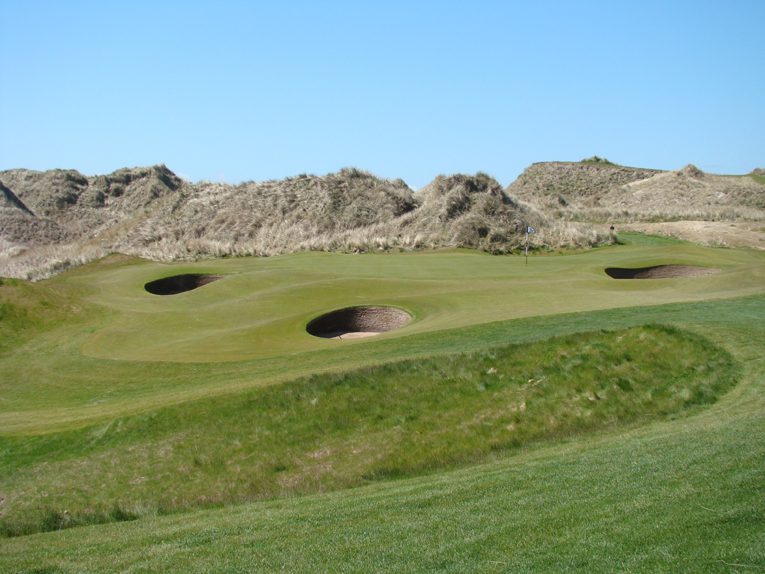
The second shot plays across a depression to a well-conceived green complex. Beware the false front!
Trump International Golf Links
Aberdeenshire, Scotland, United Kingdom
Thirteenth hole, 230/180 yards; Played from high point to high point, this one shotter stood out during the routing process and it became the first hole built. While a fair amount of dirt work occurred to make the hole good for golf, the golfer would never guess so based on how well all the tie-ins are. Marram was then planted to stabilize the land forms. According to Bambury, you take a donor site (mature area) and harvest the sprigs by hand, which are then individually hand planted. This was a painstaking process that took place during the fist winter. Due to short daylight hours during that period, floodlights were utilized to ensure that the job was done right.
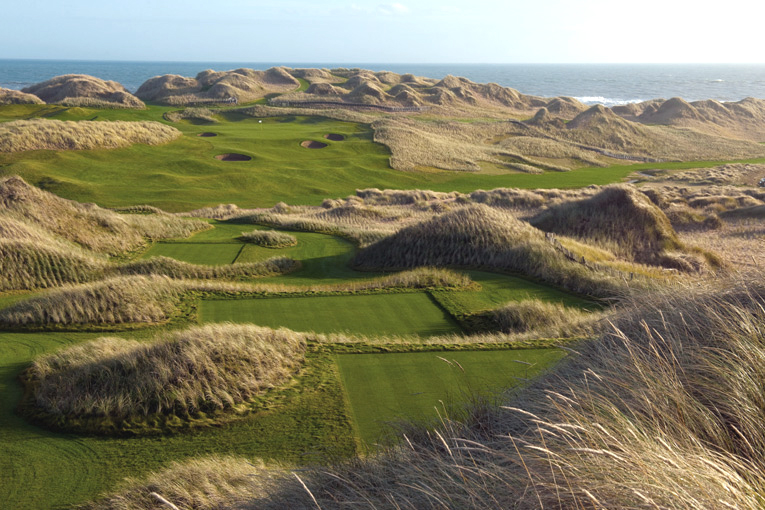
The vastness of both the dunes and the course is acutely felt from the thirteenth tee. Note how well the marram grass has come in. The team enjoyed a 95% success rate with their plantings.
Fourteenth hole, 445/375 yards; Here we are high on the tee, surrounded by nothing but massive dunes, the North Sea and the ever-present wind. The spirit soars and creates one of those inedible moments that cause golfers to travel great distances. All great links along large bodies of water have a standout moment – the third tee at Royal County Down, the fifth tee at Royal Portrush, the eleventh tee at Ballybunion, the tenth tee at Turnberry with the lighthouse nearby – and this is Trump International’s.
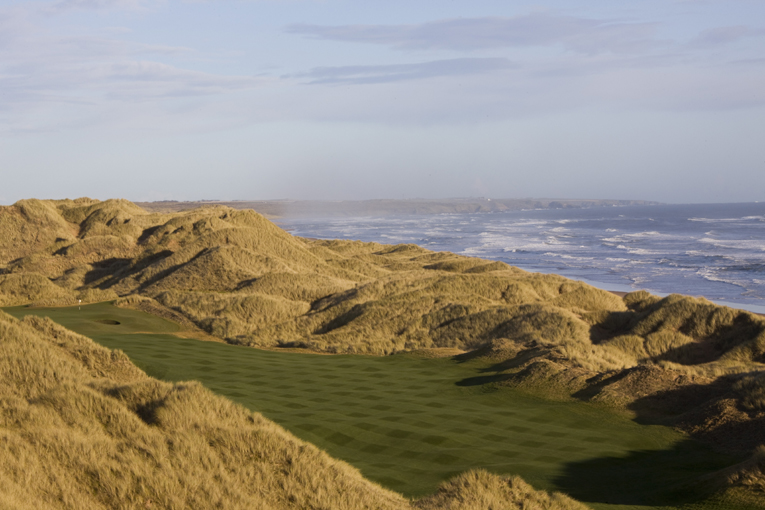
If this view from the intermediate tee doesn’t make you itch to play, give up the sport! It isn’t going to get better than this. One less obvious reason as to why the hole works so well is the height of the tee. Twenty to forty dunes line the fairway and usually the golfer is tucked low beneath the dune line out of sight of the water. That’s not true here (!) where the long view from the tee is as distinctive as it is mesmerizing.
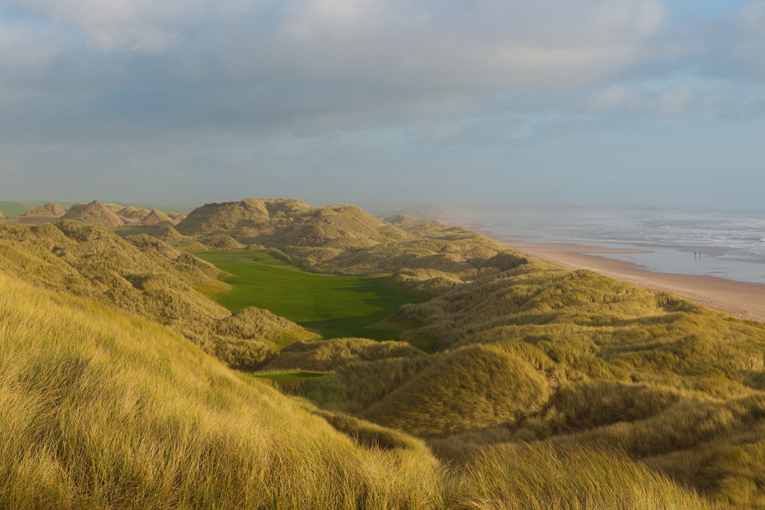
Here is the view from the back markers, which are behind and to the right of the intermediate ones from which the prior photograph was taken. The net effect is to straighten the hole. The author prefers the intermediate tee location because of the fine playing angle. The idea of 112 tee boxes, the number found here, might make you roll your eyes – until you appreciate how well so many of them play.
Fifteenth hole, 390/325 yards; The famous Redan at North Berwick and the Road Hole at St. Andrews made great impressions on C.B. Macdonald (known as the Father of American golf course architecture) and both became template holes for his work in America and Bermuda. His protégé Seth Raynor went on to build many angled greens as well. After being exposed to Raynor’s work at Camargo, Pete Dye also found this design ploy of situating a long green 45 degrees to the line of play much to his satisfaction. Quirky angled greens exist at shorter links throughout the United Kingdom but they curiously are rarely encountered on the 7,000 yard Open courses save The Old Course. It’s nice to see this design tactic utilized throughout this course particularly at this long slender green.
Sixteenth hole, 195/180 yards; Splashy first impressions sometimes give way to something less enduring. For instance, the bathtub fourteenth green at Cruden Bay about thirty minutes away wowed the author the first time he played it. Yet, each subsequent visit saw its charms diminish as the same result is seemingly meted out time and again regardless of the quality of the strike. The opposite may hold true for this hole. Relatively straightforward in appearance, the more you play it, the more you will appreciate it. The 7,000 square foot putting surface enables an array of hole locations that dramatically alter the type of shot required with the prospect of hitting a low draw to skip to a back left hole location is as enticing as a soft fade to a front right hole. There can be as much as a four club difference depending on the day’s hole location. Time will tell but the solid golf asked by this hole should stand it in good stead with the other three more spectacular one shotters.
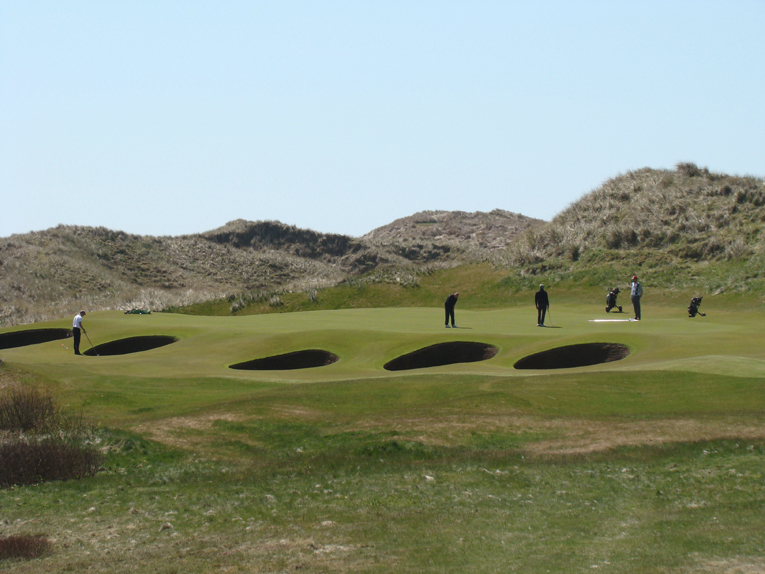
At almost 40 yards yards from right to left, numerous hole locations exist and shot type can vary greatly from day to day. The green keeping staff is cognizant of where the holes are set at each of the par threes because the intermediate tees measure 165, 170, 180, and 180 yards. Yes, they go in several different directions but care needs to be given that a range of clubs is asked of the golfer. The broad dimensions of this target facilitate that objective nicely. Hawtree used seven bunkers to liven up the proceedings at the sixteenth. In fact, it has more bunkers than the first three par threes combined.
Seventeenth hole, 465/400 yards; Murderously difficult into the prevailing wind, this is one of the hardest pars on the course. Like The Old Course it is nice to see the penultimate hole being more difficult than the Home hole. The challenge is severe, especially into the wind, but the architect has provided an ample fairway that feeds into an angled green. The golfer that can’t hit the shot that is available can only blame himself. His thoughts might turn to how much fun it would be to watch professionals tackle this hole and the last into a stiff breeze. Of course, they have the requisite skill but can they perform in the crucible of pressure?
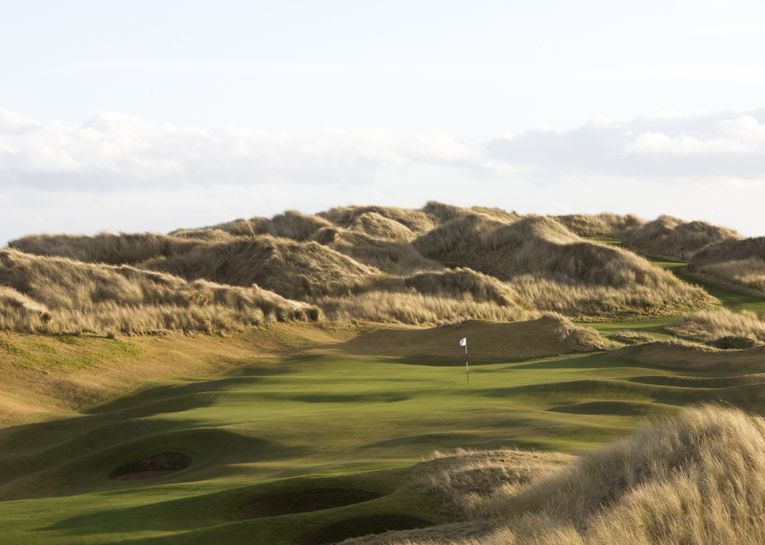
A deep depression hugs the left of the seventeenth fairway. Can the golfer manufacture a low draw through the wind that avoids the two bunkers 40 yards short of the green in the foreground and scats past the single greenside bunker onto the long angled putting surface?
Eighteenth hole, 650/585 yards; The most controversial hole on the course is in truth a fine and distinctive closer, reminiscent of no other Home hole. Nothing is gimmicky or tricked up. Played into a two club wind, it is certainly a strenuous examination late in the round. Under pressure, the hardest shot to hit may well be the straight ball and that is what is required here.
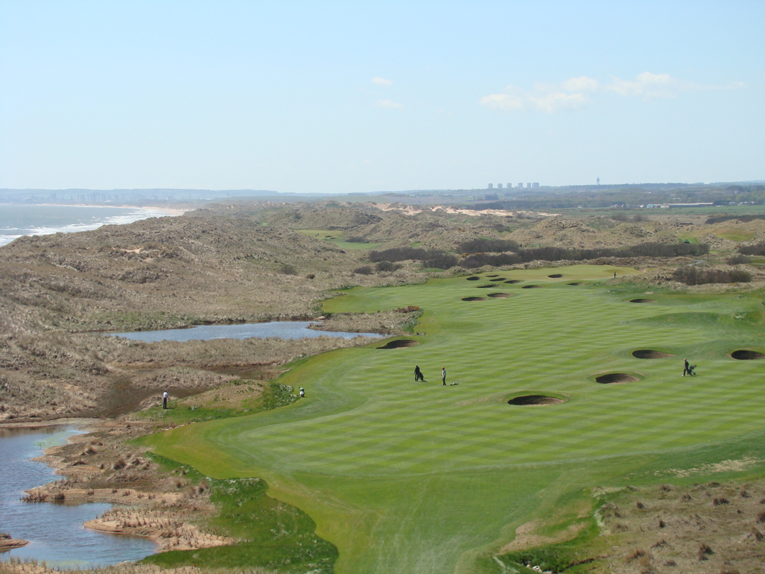
The sight of a well-struck tee ball soaring into the distance and over a pair of central fairway bunkers is one of the day’s most memorable moments.
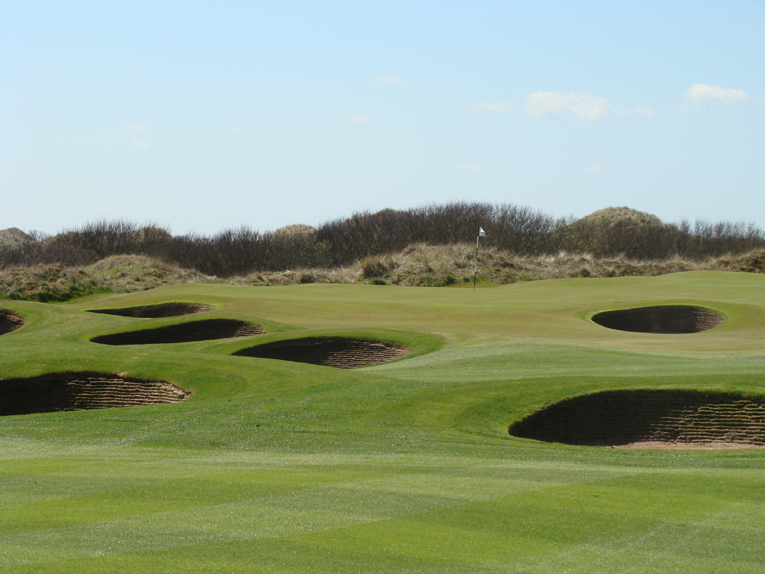
As captured 150 yards from the green, the smooth lines of the bunkers and architecture presents an appealingly clean, frank challenge. Often played into the wind, is the golfer and his swing up to the task at this late stage?
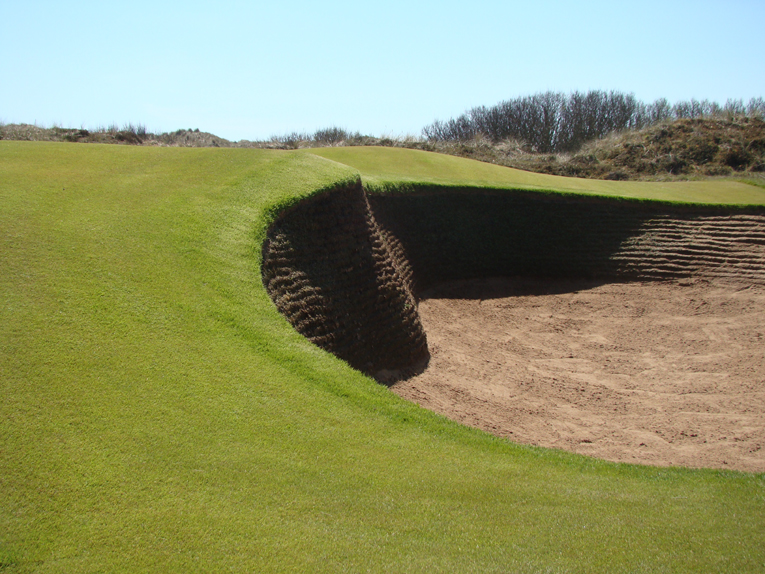
John Bambury and crew do an outstanding job of having fairway height grasses feed into the bunkers. Though revetted pot bunkers are generally smaller than typical bunkers, the ones here play large as balls are gathered from well away.
That’s what the course has. What doesn’t it have? An uphill tee shot for one. Few golfers will lament that fact but old school fans of links golf will feel a tinge of regret that this tumbling landscape didn’t cough up one such tee ball. Indeed, there are only three significantly uphill shots on the course and they are found on the approaches to the fourth, tenth and fourteenth greens. The vistas obtained from the numerous elevated tees are largely derived from uphill green to tee walks. The goods news: the golfer is amply rewarded for such walks.
No judgment can be made while the course is in its infancy but one wonders if the owner will strive to get the course brown and crusty, fast and firm once it matures? To do so will require a change in the mix of rye grass and blended fescues that is presently utilized tee to green. Though rye provides a shade of green that contrasts beautifully against the dunes, its playing characteristics are a bit too sticky to provide the bouncy-bounce playing conditions that makes links golf its thought-provoking best.
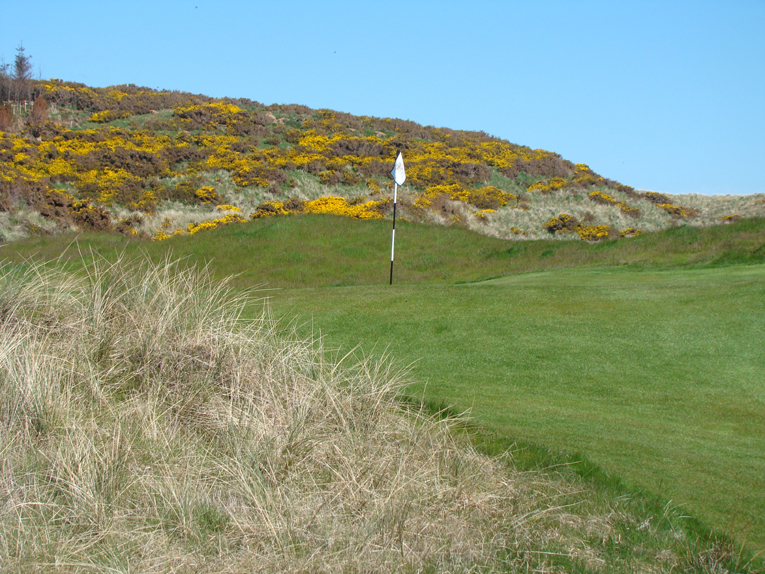
Save time for the short game area. May is a particularly good time to be there as the gorse is in full bloom. Also, the 29,700 square foot putting green at the base of the dunes is the idyllic place to perfect a silky stroke.
A second course has been routed by Hawtree. It will compliment but not compete with the first because its landforms are so different. Its mix of heathland holes that give way to holes in a big blow-out sandy area will assuredly find a devoted following.

This Neo-Jacobean mansion c. 1835 is in the middle of the 2,000 acre estate. A major restoration has just been completed and the MacLeod House (so named after the owner’s Scottish born mother) now provides lux accommodations approximately one mile from the first tee.
As one might expect, this is a big scale operation with everything done at top levels including publicity. Not a single person will accidentally stumble onto this course as Herbert Warren Wind once did at Royal Dornoch, for instance; rather, every player will come here with formed expectations of one sort or the other. Rare for a course that created heightened expectations, many will leave thoroughly exhilarated by their walk beside, around, up and down the great dunes of Scotland and will be anxious for a return visit.
The End



